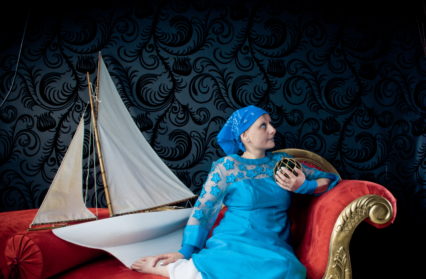Reardon Smith Theatre, Cardiff
Billed as Ffatri Vox, the title of a commission from the Festival of Voice, this concert gave us much more besides and revealed Inge Thomson as a musician who is literally wired for sound.
Thomson endeared herself to her audience immediately by her opening remark “What a pleasure to be in Cardiff”, and despite initially feeling rather far away across the empty apron of the Reardon Smith Theatre stage, she and her regular playing partner Fraser Fifield quickly established a rapport with the audience as they shared sounds inspired by Fair Isle, the “wee rock” just 3 miles long between Shetland and Orkney where her father was a lighthouse keeper. She has translated the kaleidoscope of the light which she experienced there as a child into myriad sounds, using what she calls the “bleeps and squeaks of electronic tomfoolery” together with melodic instruments –Thomson plays accordion, Fifield is on whistles and sax.
The really clever and alluring thing that Inge Thomson does is to loop and layer the sounds of her own voice, laying down a riff and then building up a song upon it. During her first set she gradually revealed just how skilfully she achieves sound pictures. The Snowstorm, a song from her album Da Fishing Hands (2014), pictures the mass of kittiwakes on the coast of Fair Isle, looking for all the world like a snow storm. Fraser Fifield played like a pied piper in beautiful counterpoint, elaborating the musical textures. In a song about a fisherman who only on his retirement revealed that he had spent his whole life in fear of the sea, the fluttering sounds from the whistle portrayed those anxieties graphically.
Other songs filled out Thomson’s musical persona – Cycle from her first album Shipwrecks and Static (2009), His Machines, in dislocated rhythms, about her “sparkly, amazing” grandfather, 92, still living on Fair Isle and still learning new tunes on the fiddle, a song by her cousin, Lise Sinclair, set to a poem in Shetland dialect by the poet Stella Sutherland, and an anti-war song, “because war is shit.”
Then, most tellingly of all, a song in which Fifield had a sit-down and Thomson put down her accordion to sing a solo number, spooling and weaving it with her “electronic tomfoolery”.
In the second half of the concert, Thomson and Fifield were joined onstage by singer Julie Murphy from the Welsh folk band Fernhill and Brighton-based musician Tom Cook on guitar for the commissioned piece Ffatri Vox. In this Inge Thomson has incorporated and built upon extracts from the eponymous Voices from the Factory Floor, recordings of women speaking about their experiences of working in the manufacturing industries of Wales between 1945 and 1975, collected by Women’s Archive of Wales. Snatches of speech are included verbatim, turned into song in English and Welsh and, like Thomson’s other work, enhanced by use of electronics by all the performers. Some of the extracts used relate directly to sound – the noise in factories which meant women had to learn to lip-read, for example.
The blend of Thomson and Murphy’s voices was a rich one and the piece packed full of fascinating historical facts. Sounds of breaking glass heralded a woman talking about workers in the Corona factory in the Rhondda wearing clogs to protect them from broken glass bottles. And those sounds generated others in the piece, with Julie Murphy singing in Welsh about the women being recognised in the streets of Porth from the sounds of their clogs.
I wonder whether Thomson and her collaborators will develop this piece further – she mentioned that they’d been recording in MusicBox Studios in Cardiff so I hope a version of Ffatri Vox on disc will emerge from that. It’s a piece that will repay repeated hearings in order to glean all the detail from it.
This was a performance full of delights and signposts to further ones, some connected with voice in ways well beyond what I expected. I grew up with the Corona man coming to call, but never knew that those glass bottles of pop came from Wales. For me it’s been an eye-opener to go to the website for Voices from the Factory Floor and read more of the experiences of some of the women who worked there at that time.
Inge Thomson showed herself to be a performer both in absolute command of her material and generous to her fellow musicians on-stage and off-stage technical support alike. Her encore, After the Flood, was a rollicking number which included the line “we’ll sing songs forever” and certainly made me at least want to do that very thing after an enriching concert.



 Enjoyed this article? Support our writers directly by buying them a coffee and clicking this link.
Enjoyed this article? Support our writers directly by buying them a coffee and clicking this link.







